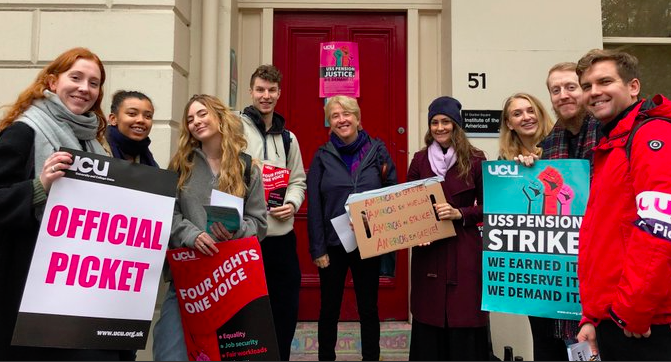With UK academics in the midst of 18 days of industrial action over pay, pensions, workload, and casualisation, we wanted to create a space to hear, understand, and engage meaningfully with different points of view around the strikes. Five academics share their personal reflections on why they are striking (or not), the impact it will have, and how they address the issue with their students.
 “I left the union and I won’t be taking part in another pointless and damaging strike.”
“I left the union and I won’t be taking part in another pointless and damaging strike.”
Alexander Douglas, University of St Andrews
 “I’m very proud to be striking. It’s about making a better future – for all our students.”
“I’m very proud to be striking. It’s about making a better future – for all our students.”
Xine Yao, UCL
 “I do struggle a bit to make sense of the strike strategy. I honestly don’t know how my family will cope with the loss of earnings from 18 strike days.”
“I do struggle a bit to make sense of the strike strategy. I honestly don’t know how my family will cope with the loss of earnings from 18 strike days.”
Anon, Scottish university
 “The cuts to pensions particularly anger me – they are so unnecessary and unjust.”
“The cuts to pensions particularly anger me – they are so unnecessary and unjust.”
Camilla Royle, LSE
 “By striking, we show that it is we who keep the system running, and that we have the power to stop it.”
“By striking, we show that it is we who keep the system running, and that we have the power to stop it.”
Lili Schwörer, Oxford Brookes University
 Alexander Douglas, Lecturer in Philosophy, University of St Andrews, UK
Alexander Douglas, Lecturer in Philosophy, University of St Andrews, UK
How are you responding to the call to strike?
I left UCU in 2021, so I won’t be striking. I keep wanting to rejoin, but then they call another pointless and damaging strike.
What is your motivation for participation or non-participation?
Bluntly, the irresponsibility of UCU’s leadership. They’ve called a strike over USS pensions, although it is now too late for the fund to change benefits before the March 2023 valuation. They campaign to keep rejecting pay offers but don’t show how any counteroffers would be affordable for the poorest universities (at least without redundancies). They repeat the mantra that the sector has “£40bn in reserves”, although this figure includes non-cashable assets and isn’t held in common by all institutions – plus institutions are required to hold some cash reserves by bank covenants. This sort of blatant, manipulative spin destroys trust. They also complain about a lack of concrete offers on workload, equality, and casualisation while failing to make any concrete, feasible demands. Some seem to believe that strikes are a jolly occasion and perhaps aim to keep having them for self-aggrandising or team-building purposes.
What impact will the strike action have on you?
When I went public with my criticisms of UCU’s strategy, I received a lot of anger over emails and social media, which was understandable. I started to feel unwelcome in the union but leaving felt bad. I’ve always been a strong supporter of trade unions and never thought I’d get to a point where leaving felt like the only option. I fully support my colleagues in their decisions and admire their commitment to doing what they think is right. But I’m disappointed by academics in general. I used to think they were critical, independent thinkers, but there’s been a real “in-crowd” dynamic here, which I find embarrassing. There’s a lot of glorifying of those who conform and mouth the slogans while damning those who criticise a self-harming strategy.
Do you address the issue of the strike with your students?
I tell my students the bare minimum: I left the union, and I’m not striking, and I care about many of the issues, but I personally believe that the union’s strategy is too counterproductive and damaging to support in good conscience. I don’t want to undermine the efforts of my colleagues further than I have to in order to be honest. I try to convey to students that I might well be wrong in my position, that I don’t condemn the actions of my colleagues at all, but we all just have to do our best to get things right.
What options other than striking could be explored – either alongside or instead of?
I believe that UCU could, if it wanted, put together a set of coherent, fully costed demands, which UCEA could accept and would greatly improve the lives of staff in greatest need. For example, they could take UCEA’s most recent pay offer and increase the pay uplift on the lower points of the scale by reducing or eliminating the demand for uplift on the higher points. This would add no net cost, so UCEA could easily accept it. It would hugely help lower-paid staff while accepting that people on salaries like mine, let alone professors, are hardly a poverty risk; they’re low-priority. UCU could also say what they want regarding equality, casualisation, workload, etc, and make clear proposals within the budgets of the poorer universities (financial statements are publicly available). I’ve offered to help with this, but the majority would apparently rather put on a big show every few months.
 Xine Yao, Lecturer in American Literature in English to 1900, UCL, UK
Xine Yao, Lecturer in American Literature in English to 1900, UCL, UK
How are you responding to the call to strike?
I’ll be doing an all-out strike. I’m very proud to be striking and I think it’s a necessity. I may not be able to be on the picket because I am recovering from long Covid but on strike days I try to boost as many Twitter posts as I can, to help to spread information.
What is your motivation for participation?
The sick leave and support I’ve had for a phased return to work is very much indebted to the struggle of labour efforts and work of unions over the years. My union rep was instrumental in supporting me to have conversations with my head of department, who is also very supportive. Without the union rep, I would have felt far more stressed and insecure, particularly because this year I’m applying for indefinite leave to remain – I’m a migrant. UCL has been talking so much about cuts, and I felt very anxious and precarious since I didn’t know what my timeline to recovery would be like and the impact on my employment status.
Literature and the rest of the humanities are being decimated and devalued. Humanities departments are getting slashed except at elite universities, which means our fields of study are becoming more exclusionary. Research meritocracy will not save us: Birkbeck English ranked as one of the top departments according to the recent REF and yet it is facing massive cuts to staff.
What impact will the strike action have on you?
Striking is very hard, financially and emotionally. It will have an impact but, of course, the point of striking is to have impact. It’s about making a better future, not just for me as an individual or those fortunate lecturers like myself with permanent positions, but for all of our students – undergraduate, masters and PhD. If we’re not advocating to make the system better, or to reduce the disproportionate amount of casualisation happening across the sector, we’re selling them a pipe dream. I can’t in good conscience be a teacher who cares about my students, who’s committed to pedagogy, who tells my students to be critical thinkers, and then sends them out into a world that devalues their degree and wants to exploit them for cheap labour. I work on feminism, gender, sexuality and race and these interconnected struggles really require a multifaceted approach.
I’m very privileged, being a permanent member of staff, and I have a partner. But that’s precisely why I think people like me who are in a more secure financial situation have an obligation to strike and contribute to the solidarity fund for all our precarious colleagues.
Emotionally it’s difficult because of the things I teach – it means my students are not going to get that teaching. During previous strikes I’ve done collaborative teach outs with colleagues on subjects such as decolonisation and artefacts of the British Museum, and LGBTQ labour activism, where with a colleague in art history we created a blanket banner with people stitching their stories into it. It was an opportunity to bring together so many different voices across different disciplines, staff and students, and have collaborative activities that I as an individual would never have been able to create.
There is also a sense of solidarity across all the different trade unions who are striking. That so many different sectors were able to coordinate to make February 1 2023 a day of action helps show that our struggles are deeply interconnected in terms of making a better society.
Do you address the issue of the strike with your students?
Every time we go on strike, union members in my department hold a town hall meeting to talk to students and address concerns. Rather than getting difficult questions, the overwhelming messages of support from students are fantastic. It means a lot when students show up to the picket or send messages of solidarity. Some Chinese international students put together an explainer of the strikes in Chinese, which was a great example of student solidarity and resource.
Over time I’ve refined my out-of-office message. From initially just saying “I’m on strike”, I added a link to the solidarity fund and then the tool that allows students to send emails easily to our provost, for instance. Finally, I’ve added a good explainer, an overview for students who might be less familiar with trade unions, because they might come from a different context. This is also helpful for people internationally who might not be in higher education and who don’t know why we have been doing these strikes.
 Anon, Academic Developer, Scottish university
Anon, Academic Developer, Scottish university
How are you responding to the call to strike?
I am participating in the strike action – withdrawing my labour on the designated strike days – and in the action short of a strike.
What is your motivation for participation?
I do struggle a bit to make sense of the strike strategy. That’s partly because of my own ignorance: I’m not an expert in industrial relations; many of the specific issues – pension valuations, university cash flow, pension regulation – are complex; and I’m not involved in the internal union machinations. And it’s also because the situation is less clear-cut than in the official ‘public sector’, where the government sets the pay (de facto) and decides the funding available. While the union likes to portray universities as swimming in cash – and there may be a sensible PR strategy behind that – the reality is that many universities are broke; and the fact that some are rich doesn’t help the ones that aren’t to fund pay rises. I don’t believe that university leaders act out of greed or malice (and I would be wary of anyone who does believe that) and in some crucial respects they are caught in the middle. I see the strike action partly as an attempt to influence university leaders where they can take action (for example, to pull back from purposely picking a fight over our pensions) but mostly as an attempt to influence UK governments (current and future). For us as employees to have fair pay and conditions, for students to have the kind of experiences and outcomes previously expected, and for HE professions – particularly the academic profession – to retain their status as highly desirable career choices, governments simply have to provide more funding. And here in Scotland, the SNP needs to do more than just point to the lack of tuition fees. They need to decide if they want things free but cut-price, or if they want to protect the traditional strengths of the sector by funding it properly.
What impact will the strike action have on you?
I honestly don’t know how my family and I will be able to cope with the loss of earnings from 18 strike days. I find striking very stressful, mainly due to the impact on my workload: the work I’m supposed to do on strike days largely does not go anywhere, it just piles up.
Do you address the issue of the strike with your students?
I provide a brief explanation in terms of the basic union position (with a link to the union website), and then offer to discuss it further if they have any questions.
 Camilla Royle, Fellow in Geography and the Environment, LSE, UK
Camilla Royle, Fellow in Geography and the Environment, LSE, UK
How are you responding to the call to strike?
I’m playing as full a role as I can in the strike action. I won’t work on strike days or share lecture materials from previous years with students. I also plan to attend the picket line with other UCU members and our student supporters. I took part in the first day of picketing on 1 February. It was fantastic to be part of a day of action alongside thousands of teachers and other striking workers and to know that protests like this were happening all over the country. I’ve been on strike before but this year things feel different as there is an uptick of workers in other industries on strike as well and apparently lots of public support for it. In the coming weeks I’d like to visit other picket lines around London. I think we in UCU have a lot of experience to share with other workers because we have taken extended periods of action as opposed to single days or short periods of strike action.
What is your motivation for participation?
On one level, participation is out of respect for the democratic decision of the union; more than 80% of union members voted to take industrial action so I feel that it is well supported. In terms of the issues involved, the cuts to pensions particularly anger me. I’m in my 30s so people perhaps assume that I’m more motivated by casualisation or workload – which I am also interested in – but the pensions cuts are so unnecessary and unjust. I see reports all the time of people leaving the higher education sector and I think big changes are needed in how universities are run. It seems like more and more money is being pumped into the sector in terms of student fees but without a corresponding investment in staff, which ultimately benefits no one.
What impact will the strike action have on you?
Of course, it will have a financial impact as we don’t get paid for being on strike. Some staff will find that difficult, especially those with children or other caring responsibilities although there is a small hardship fund from the union. The way tax is calculated means the deduction isn’t as much as you might assume but it’s still a substantial loss of pay. However, the pay cut we are facing relative to inflation means that if the strike isn’t successful and we don’t get a higher pay offer from our employers, we are all going to lose about a month’s pay every year from now on in any case.
Do you address the issue of the strike with your students?
I have been clear with the students I teach that I will be on strike. I’ve been perhaps a little too open about it as I’m sure this means my department knows when I’ll be on strike. But I think, on balance, we should be clear with our students about what it will mean for them so they can plan their lives. I try to explain the wider reasons for the action, particularly in terms of casualisation as I’m not sure students realise when they come to a university like the LSE how much of their education, especially class teaching, relies on staff with hourly paid contracts. I think gender and racial inequality in staff pay is also an issue that interests students. There is a lot that staff and students could work together on – for example, the UCU is opposed to tuition fees and the marketisation of higher education. I don’t know whether we are always as open as we could be about that aspect of our policy and what it means for the type of education system we want to see. That’s the type of topic we could discuss on picket lines with teach-out events.
What options other than striking could be explored – either alongside or instead of?
The examples and models I’ve seen from other higher education systems mostly involve striking. For example, there was an open-ended strike of graduate students at Columbia University last year which was successful in reaching an agreement with the employer. I believe it was combined with a tuition fee strike, which must have added to its effectiveness. UCU is doing other things, such as lobbying elected politicians, as well as striking. But I think the negotiators have a better chance of winning if they are backed up by the threat of action from us – so it has to be alongside, rather than instead of, strike action. The union has also notified a marking and assessment boycott, which will be a serious escalation of the action we are taking now.
Lili Schwörer, Teaching Fellow in Sociology, Oxford Brookes University, UK
How are you responding to the call to strike? 
I am on strike. I attend picket lines at my workplace whenever I can afford the travel costs from London to Oxford. I also sometimes visit picket lines, protests and teach-outs at more local universities.
What is your motivation for participation?
The strike remains the most powerful tool that workers have to make meaningful changes to working conditions, and to society more broadly. There are two key, interconnected reasons for this: the educational and the material power of strikes. Not only does striking give us the opportunity to speak out publicly about our working conditions and the state of universities, but the very act of a strike illustrates the role (and also radical potential) of wage labour in a capitalist economy. By striking, we show that it is we who keep the system running, and that we have the power to stop it. We also form bonds of solidarity, both practical and emotional, with those that share this relationship to capital. Materially, the strike has the potential to stop capital accumulation through our labour. The UK university system is now a marketised one, deeply embroiled within racial capitalist processes of accumulation. We are confronted with a very real possibility of challenging this.
What impact will the strike action have on you?
The strike action enables me to deepen bonds with staff and students in my workplace and in other universities, as well as with striking workers in other sectors. Of course, there have been moments of exhaustion and exasperation, but feelings of joy, excitement, commonality, belonging, and mutual support hugely outweigh these. So much political education happens on the picket lines: we learn about each other’s shared challenges and differing experiences, thereby understanding better how our workplaces function. So many moments of friendship, support, and solidarity happen on and around picket lines: the strike gives us the space to connect outside of the daily pressures of unmanageable workloads. I am, of course, losing a significant amount of my pay; as a precariously employed teaching fellow this hits hard. However, I also don’t see a future for labour in universities without a radical transformation, so this is a sacrifice I’m more than willing to make.
Do you address the issue of the strike with your students?
Yes, I do. As a sociologist, the strike ties in nicely with the topics we discuss in many courses, and with what I understand the aims of the discipline to be. I am honest with my students about the state of higher education, which is made easier by the fact that the marketisation of Higher Education was the topic of my PhD research! UCU’s key message, that our working conditions are students’ learning conditions, is incredibly apt, and I use this as a way of responding to questions about loss of contact hours.
What options other than striking could be explored – either alongside or instead of?
I do think that the strike is the most effective tool that we have. However, there are other options that are explored or could be explored alongside strikes. For example, many of the challenges that higher education staff face are linked to pervasive audit culture, including measuring student satisfaction through the NSS. We could do more collectively to challenge audit culture, for example, through a boycott of audit procedures. There is also a huge need for more action on border controls and racialised surveillance in HE. Groups like Unis Resist Border Controls have been doing incredible work on this for years, but all HE staff members should be active against borders in our workplaces. I also think that there is a big potential for student solidarity action with strikes such as the recent LSE student sit-in. The UK’s draconian strike legislation make the scope for making claims beyond our immediate working conditions very narrow. Direct action in addition to the picket line has the potential to strengthen resistance against the marketisation of higher education, and its connection to racism, sexism, (dis)ableism, homophobia, and transphobia.
We would like to thank all our contributors for their reflections.
_______________________________________________________________________________________________________________________
This post is opinion-based and does not reflect the views of the London School of Economics and Political Science or any of its constituent departments and divisions.
_________________________________________________________________________________________________________________________
Image credit: UCU resources




